The Great War Begins
The Lamps Are Going Out
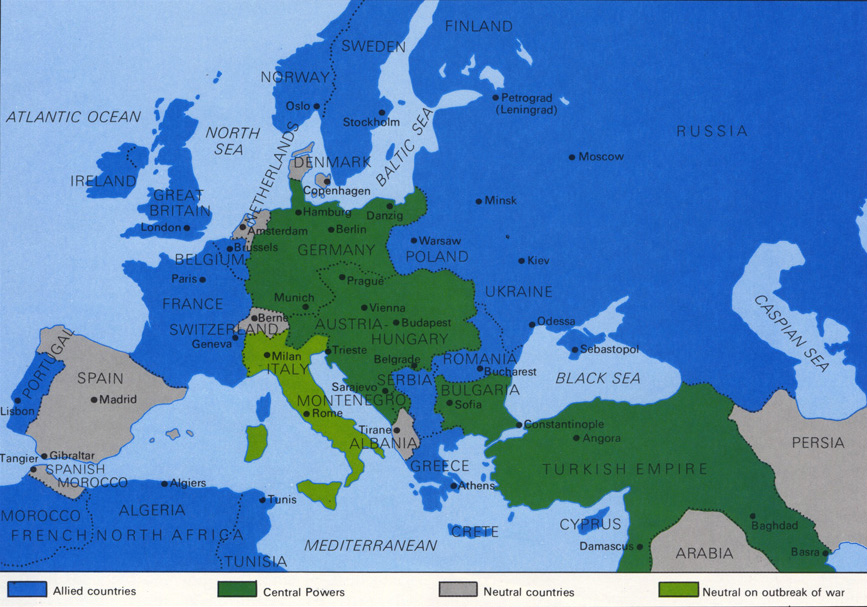
Pre-war Europe
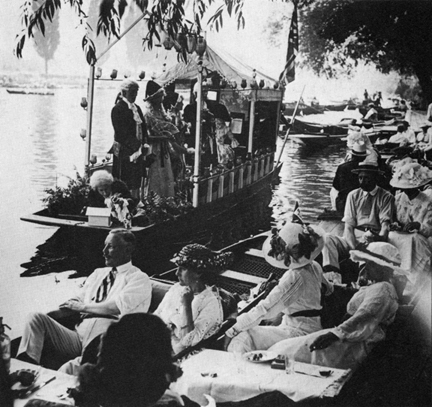
An afternoon at Henley Regatta 1914
When the Archduke Franz Ferdinand and his wife Sophie set of in an open car on Sunday, 28 June 1914, to pay an official visit to Sarajevo, the capital of the Austrian province of Bosnia, Europe seemed to be enjoying more settled peace than for many years. The tensions that had brought the great pawers to the verge of war in 1905 and again in 1911 seemed at last to have relaxed. In 1912 good sense and moderation had prevented wars in the Balkans from exploding into a general confict. All over Europe that Sunday respectable families went to church in celebration of the established order — father at the head of the family, the monarch at the head of the nation, and God in His heaven. Then came the peaceful Sunday pleasures: an afternoon on the beach or river; meandering along the dusty lanes by bicycle; a stroll in a city park listening to the band; and for the aristocracy and gentry at the apex of the social pyramid, tea on the lawn in a cedar’s shade. Kaiser Wilhelm II of Germany spent the day aboard his yacht at the elegant Kiel Regatta; President Poincare of France at the races at Longchamps, amid gentlemen frock-coated in the summer sunshine and huge-hatted ladies brilliant in Poiret gowns.
With the exception of the French Republic, this was a Europe of kings and emperors — and a sultan, of Turkey. In St Petersburg (now Leningrad) the pious Tsar Nicholas II ruled over a Russian Empire extending from the borders of Germany and Austria to China and the Pacific; a country of vast spaces and poor communications, of backward peasant agriculture and a belated industrial revolution. In Vienna the old Habsburg Emperor Franz Josef united in his of person the multi-language peoples of Austria-Hungary - the German-speakers of Austria itself, the Czechs of Bohemia, the Poles of Galicia, the Hungarians, the South Slavs of the newly acquired Balkan provinces of Bosnia and Herzegovina. From Berlin Kaiser Wilhelm II - neurotic and vain - ruled a German Empire only united since 1871, a brash, powerful, ambitious newcomer among nation states; indeed the major unsettling influence in Europe. For since 1871 Germany's industries had grown in huge bounds: her steel production had risen by more than 500 per cent, and now stood at twice the British figure. She possessed the greatest chemical industry in the world. Not content with the largest and most efficient army in Europe, she had challenged British command of the sea by creating a formidable high-seas fleet in hardly more than ten years. All this lay in the hands of an unstable monarch and governing circles that were determined to push Germany's claim to be a world power. And in London George Ms the King-Emperor, reigned over the British empire; the empire which Germany most envied and wished to overtake. This empire was made up of India, wide tracts of Africa, Malaya, scattered islands in the Pacific; the whole of Ireland; the self-governing dominions of Australia, New Zealand, Canada and South Africa.
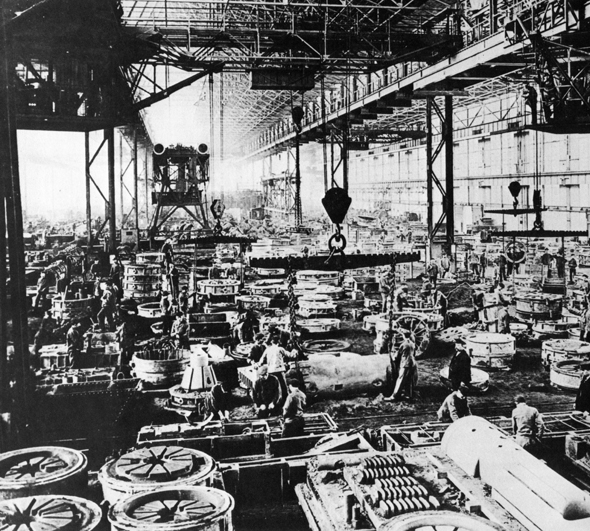
The main steel-casting plant at the Essen Krupp works. Since German unification
in 1871,
German steel
production had increased by 500 per cent.
In 1914 it was
twice British production.
It was the high noon of the nation state, recognizing no authority superior to itself, no morality beyond its own self-interest. This claim to untrammeled sovereignty was embodied in armed forces kept up to the greatest strength and preparedness that could be contrived. The courts, cabinets and foreign offices busied themselves with the traditional European power game, seeking to win advantages and parry threats by means of intrigue or intimidation. It was also the high noon of nationalism - even the rootless masses living grey existences in the new industrial towns found emotional escape in a romantic patriotism. They were stirred by symbols such as the national flag as are modem football supporters by club emblems and colours. They exulted in the power represented by their nation's armed forces, troops on parade and clanging bands; battleships in line-ahead. 'Future war' fantasies encouraged their readers to think of war as an exciting adventure; a test of manliness. Even poets and artists could glamorize violence and war as means to cleanse the human spirit of the corruption of peace. Influential thinkers garbled the biological ideas of Charles Darwin about 'the survival of the fittest', and preached that the entire life of a nation must be organized and directed towards defeating its rivals either in commercial rivalry or war.
Nationalism could extend beyond the bounds of the nation state and become a form of racialism. The British looked to the self-governing dominions and America and dreamed of an Anglo-saxon leadership of the world; the Germans of Austria and of Germany proper saw German civilization as threatened by the Slavs of the East; the Russians and their fellow Slavs in the Balkans perceived a common 'pan-Slav' destiny.
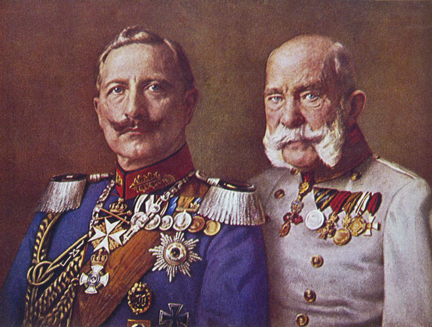
Kaiser Wilhelm lI, Emperor of Germany from 1888 to 1918
with Franz Josef, Emperor of Austria from 1848 to 1916
Against the background of such a climate of opinion the cabinets of Europe pursued their dangerous rivalries. Mutual fear between states and alliances bred an arms race that bore more and more heavily on national budgets because of the ever-faster pace of technological change, rendering weapons and ships out of date within a few years of construction, and unimaginably increasing the destructiveness of war, if war should ever come.
Yet the European tensions before 1914 lay not only between nation states but also within them. Beneath the outward pomp and power of monarchies, beneath too the sober, study, prosperous pattern of middle-class life, fermented the discontents of the masses. The class war cut across the prevailing nationalism. In Russia in 1906 a revolution had been repressed with difficulty by the Tsar. In Germany the working-class Social Democrats now formed the largest single party in the Reichstag, the German parliament. In France a wave of revolutionary and often violent strikes took place between 1906 and 1910, and were ruthlessly suppressed by the authorities. In Britain, there had been similar terce industrial unrest. In November 1910 a South Wales coalminers' strike had erupted into violence at Tonypandy, and the Chief Constable of Glamorgan called for the help of troops. In 1911 there were a seamen's strike, a carman's strike and dock strikes. In Liverpool troops opened are, killing two people, before rioting could be quelled. The very next day a rail strike began; at Llanelli tile troops opened fire again, causing two more casualties. In 1912 came a national coal strike and a London dock strike. In 1913 the number of strikes and the total of union membership rose to a peak. In April 1914 the Miners' Federation, the National Union of Railwaymen and the Transport Workers' Federation formed the 'Triple Alliance', which some people feared might presage a revolutionary general strike in the near future.
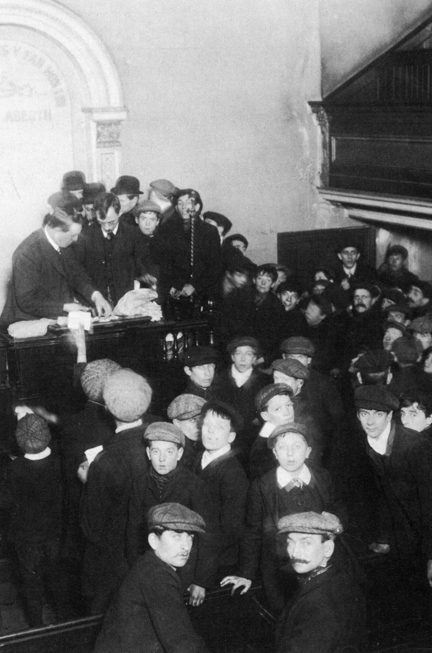
There was fierce industrial unrest before the beginning of the
war. In 1910 a South Wales coalminers' strike erupted into
violence at Tonypandy. The photograph shows strike pay
being handed out.
In Britain there was internal violence too from an unexpected quarter - the women of the suffragette movement. Unable to persuade Asquith's Liberal Government to grant women the parliamentary vote, the suffragettes resorted to such means of pressure as breaking windows, setting fire to letter- boxes and buildings, cutting telephone wires and vandalizing symbols of male supremacy such as golf greens. In 1913, in the most sensational of all suffragette gestures, Emily Davidson threw herself to her death under the hooves of the King's horse while it was running in the Derby at Epsom.
Yet the most dangerous threat to the internal stability of the United Kingdom came not from class or sex convict, but from a dissident nationalism. The Roman Catholic majority population of Ireland renewed their o1d demand for Home Rule in place of government from Westminster. In 1912 the Liberal Government, dependent on Irish Nationalist votes in the House of Commons, introduced a Home Rule Bill, so beginning two years of bitter strife with a Conservative and Unionist opposition that was resolved to kill or delay the bill. The Protestant minority population in ireland prepared to fight rather than accept rule by a Dublin government - and they were encouraged by Conservative leaders in England. By the spring of 1914 the Ulster Volunteers, an unofficial Protestant militia, armed with smuggled weapons, had grown into a formidable force, as had the rival Catholic Irish Volunteers. By June the parliamentary struggle over Home Rule and the danger of civil war in Ireland were both rising to their climax.
Nevertheless, it was to the Austro-Hungarian Empire that the national aspirations of a subject race posed the most mortal threat. For Austria-Hungary was an anachronism, a multi-racial state in an age of neurotic nationalism. No logic held together this empire of mitering races and cultures; only history, which had placed them one by one under the rule of the House of Habsburg. For fifty years the Habsburg monarchy had therefore been growing weaker, its internal contradictions propelling it towards eventual disintegration. Of all the nationalist movements working to break up this ancient state, none was more dangerous than that which wanted to unite her new South Slav provinces of Bosnia and Herzegovina into a greater Serbia. And, as the Austrian Government rightly suspected, this movement was supported and encouraged from the neighboring state of Serbia. So it was that among the crowds waiting to greet the Archduke Franz Ferdinand, heir to the Habsburg throne, and his wife in Sarajevo on that Sunday, 28 June 1914, were nationalist Slav terrorists of the Black Hand Society. One threw a bomb at the royal car on its way to the town hall, but only wounded two osiers, one seriously, in a following vehicle. After an exchange of formal speeches with the burgomaster at the town hall, the Archduke and his wife drove of to visit the seriously wounded officer in hospital. As their car was passing along the quay beside the river a young student, Gavrilo Princip, Serbian by race but Austrian by nationality, fired three shots from a pistol at close range. The Archduke and his wife died within 15 minutes. From these three shots and two deaths the violence was to ripple outwards across Europe and then the world in a convict so terrible, so gigantic, that men were to remember it, very simply, as ‘The Great War’.
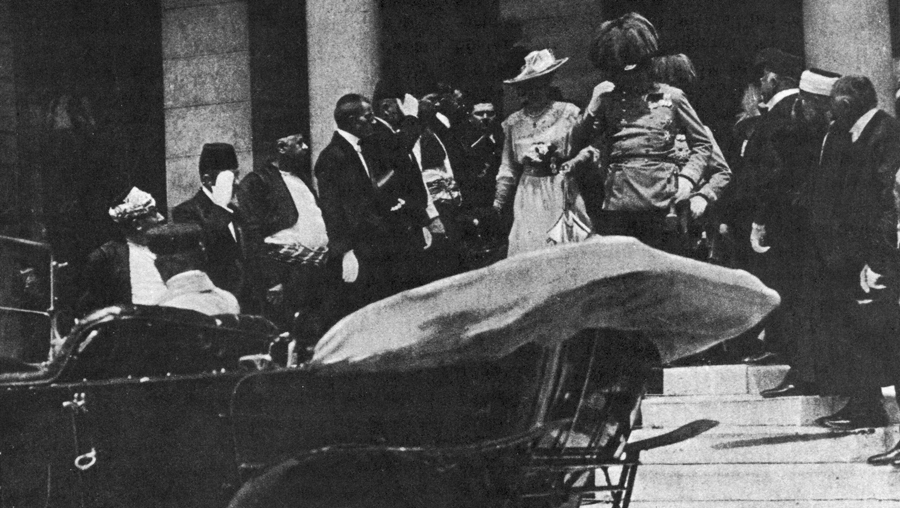
The assassination of Archduke Franz Ferdinand, heir to the throne of Austria-Hungary, and his wife Sophie, on 28 June 1914, began the final crisis that led to the Great War. The Archduke and the Duchess leaving the town hall at Sarajevo a few minutes before their deaths.
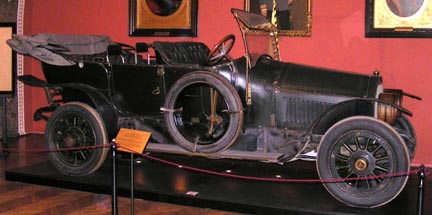
The motor car in which they travelled at Sarajevo.
Europe was divided into two armed camps glowering at each other in mutual fear - the Triple Alliance of Germany, Austria-Hungary and Italy, and the Triple Entente of France, Russia and Britain. Germany's own clumsy and bullying diplomacy, allied to her formidable industrial and military strength, had caused France and Russia to draw together in mutual support, while her challenge to British mastery of the sea had alienated Britain too. In 1913 France, with a population of only 39 million against Germany's 65 million, had lengthened the period of conscription from two to three years; her ally Russia was in the process of building strategic railways towards Germany's eastern frontier. In a year or so, Moltke and Hötzendorf feared, the military balance would have swung decisively in favour of the Entente rowers.
Assured of German backing, Austria-Hungary presented an ultimatum to Serbia on 23 July, giving her 48 hours to accept humiliating terms that would infringe her sovereignty. Nevertheless Serbia returned a submissive answer which the Kaiser himself described as 'a capitulation of the most humiliating character'. But on 28 July Austria-Hungary, determined on punishing Serbia, broke of diplomatic relations and ordered part mobilization for a local war against Serbia. Now the crisis had really broken.
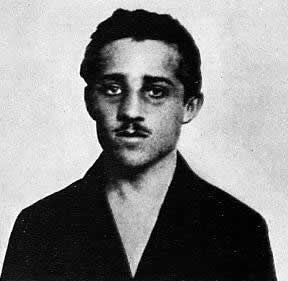
Franz Ferdinand's assasin, Gavrilo Princip.
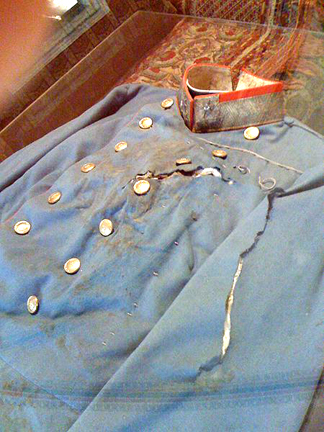
Franz Ferdinand's blood-stained uniform.
But Germany's long-matured military plan in fact left her Government with no room for choice. Germany had faced the danger of a war on two fronts ever since France and Russia concluded their alliance in 1894. In 1905 the Chief of the General Stab, Count Schlieffen, drew up the final and perfected version of a daring plan that gambled on defeating both enemies outright within six weeks. Leaving only scanty covering forces facing the slow-mobilizing Russians, Germany would throw almost the whole of her field army against France through Holland and Belgium, outranking the French frontier defences and surrounding the French army. With France defeated, the German forces would be sent east by rail to smash the Russians in turn. The entire strategy depended on speed. This meant that the moment Russia announced mobilization, Germany must mobilize too - and more than mobilize, proceed without delay to carry out the Schlieffen Plan. Germany was therefore the only great power in the summer crisis of 1914 whose mobilization automatically meant that war must follow. More than that, the Schlieffen Plan, with its opening offensive in the West, meant that a quarrel between Germany and Russia must immediately involve France, whether or not France herself decided to honour her alliance with Russia. More than that again, Moltke had altered the Schlieffen Plan in such a way that it now carried a heavy risk of drawing Britain into the war as well.
For instead of invading Holland in order to win space for the German advance, German assault forces were to seize the vital communications bottle- necks in Luxembourg and round Liege in Belgium, even though Germany as well as Britain stood as a guarantor of Belgian neutrality under a treaty of 1839.
Thus Berlin was the hub round which the final catastrophe revolved, and at greater and greater speed. On 1 August Germany ordered general mobilization and declared war on Russia, that country having failed to comply with a German demand to cease her own mobilization. France and Belgium also mobilized that day. On 2 August Germany demanded from Belgium free passage for her troops through Belgian territory. On 3 August Belgium rejected this demand; Germany and France declared war on each other; and the British Cabinet learned that German troops were already in Luxembourg. This news and the now clearly impending German violation of Belgium as well proved decisive in terms of British policy. Britain was in no way formally committed to go to war alongside France; the Entente Cordiale had never become a full alliance. Strong elements in the Liberal Cabinet and Party had therefore been urging that Britain should stay out of a purely European power struggle. In fact secret military agreements between the British and French general stabs and a naval agreement in 1912, whereby Britain undertook to protect the French Channel coast in time of war, constituted a moral obligation hardly less strong than an alliance; a moral obligation that the despairing French ambassador in London, Cambon, began to believe Britain was going to dishonors. The German invasion of Luxembourg and impending violation of Belgian neutrality enabled Herbert Asquith, the Prime Minister, and Sir Edward Grey, the Foreign Secretary, to win over a11 but two dissenters in the Cabinet to a war in defence of the public law of Europe and the rights of small nations. That day, 3 August, in the House of Commons, Bonar Law, Leader of the Conservative and Unionist Opposition, and John Redmond, Leader of the Irish Nationalist MPs, pledged full support. On 4 August, Bank Holiday Monday in England, the Prime Minister announced to the Commons that German troops had invaded Belgium; that the German Government had asked Britain to condone this action in return for an undertaking not to annex Belgian territory; but that Britain had answered with an ultimatum expiring at midnight (German time) which demanded that Germany guarantee Belgian neutrality or the two countries would be at war.
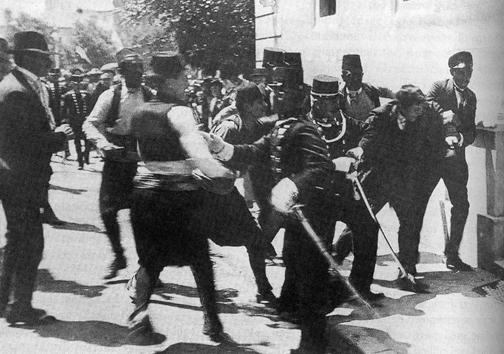
Police arrest the suspected assassin. The suspect in this photograph was believed
to be Gavrilo Princip, the assassin and the chief organizer of the assasination.
In Berlin the German Chancellor, Theobald von Bethmann-Hollweg, remarked to the British ambassador: 'Just for the sake of a scrap of paper Great Britain is going to make war on a kindred nation.' This blurted comment perfectly expressed that German attitude to international relations which more than any other factor had brought Europe step by step to disaster. Now all over Europe millions of reservists were bidding farewells to their families and trudging of to the barracks to be kitted out for the business of killing and dying. Of the members of two opposing alliances, only Italy had kept out - so far. And in every capital, including London, war had been greeted by crowds baying patriotic songs. All the hostility between somal or radar groups within the belligerent states now turned outwards against the enemy. The class war was swallowed up in a new national unity - in France called the Union Sacree; in Germany the Burgfrieden ('civil truce'). In Britain, where there was no conscription, the recruiting offices were already besieged by enthusiastic volunteers who hoped they would not be too late to miss the fighting. It was Sir Edward Grey, the Foreign Secretary, who found words to express a tragic sense of a civilization overtaken by doom. Watching from a Foreign Office window in Whitehall, on the evening of 4 August, a lamplighter at work in St James's Park, he remarked to a friend: ‘The lamps are going out all over Europe; we shall not see them lit again in our lifetime.’